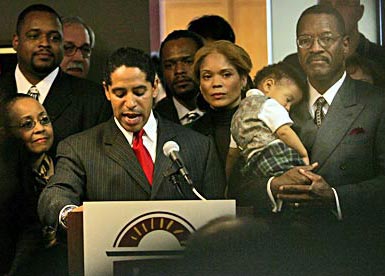
Martin Ludlow is surrounded by family as he speaks at Tuesday's news conference. (Bob Chamberlin / LAT)
The news appeared this morning that Martin Ludlow is stepping down from his post as head of the Los Angeles County Labor Federation hoping to avoid jail time in a scandal involving union money that illegally helped his 2003 campaign for the City Council. No one seems to be contesting the prosecutor's core assertions: SEIU Local 99 put some campaign workers on its payroll and ran some phone banks, giving Ludlow $53,000 worth of help that it didn't report. That is the crime.
Now there is no doubt this is illegal. Multiple levels of campaign law, local and state, place limits on and require disclosure of sources of election help. And violating those laws frequently leads to stiff fines. There are very few career politicians who haven't at least been investigated for some reporting irregularity. But what makes Ludlow's case special is that union political contributions are governed by additional federal law giving the Department of Justice and the FBI authority to step in with criminal sanctions. The LA Times reports concerns about the federal involvement:
I'm sorry, if this had been a corporation, the activity of hiring campaign workers for a friendly candidate wouldn't have been treated as "embezzlement" from the stockholders -- it would have been applauded as a good investment. And I am sure Ludlow's being Black didn't help either.Ludlow has run afoul of a section of the United States Code titled "fiduciary responsibility of officers of labor organizations." In particular, according to sources, Ludlow was investigated by the federal government for conspiring to embezzle money, property or other assets from a labor organization.
The regulation of unions has long been the domain of the federal government. ...Labor unions have complained that they are being singled out and constrained in a way that their natural opponents, the business community, are not. Such protests have only increased under President Bush, some legal scholars say.
Ludlow's departure from the LA County Fed is bad news. He's been a close ally of progressive mayor Antonio Villaraigosa. His accession to the job following the untimely death of Miguel Contreras signaled the strength of the "Black-Brown" alliance that is trying to set LA politics on a new course and model new possibilities for Democrats nationally. That current is so strong that it can likely survive the departure of one leader, but it is hard not to wonder whether we aren't seeing here that Republicans in power know a real threat when they see it.
The whole ugly mess should also be a warning to progressives enamored of various campaign finance gimmicks they hope will "level the playing field." Tinkering at the edges of how cash comes into campaigns with donation limits and partial spending caps simply disadvantages candidates and groups that start with less money. These campaign finance reform practices require people who run for office to hire armies of lawyers, accountants and specialist consultants to ensure that they stay legal. For rich candidates, this is just a cost of doing business. For insurgents, compliance with "ethics commissions" and "fair political practices" regulators is a drain on funds that should go to voter contact.
There are forms of "campaign finance reform" that would work better. The right of rich candidates to self-finance without limit (Buckley v. Valeo) must be made subject to regulation or we are further on our way to plutocracy. "Clean Elections" schemes that give state financing under regulated conditions (versions exist in Maine and Arizona) have shown promise.
But progressives need to be very careful about simply jumping on the latest "campaign finance" bandwagon. Elections are about who has power. Money will get into them because money is power. We'd be crazy to hamstring ourselves.
1 comment:
Post a Comment